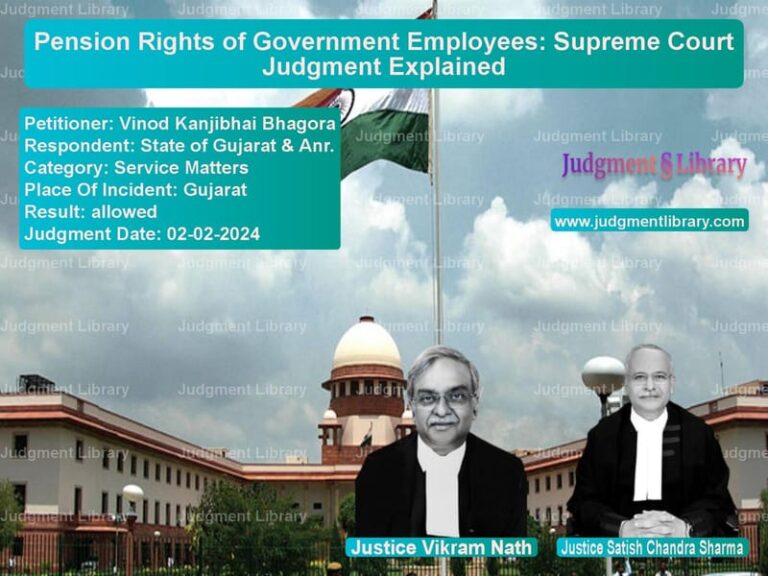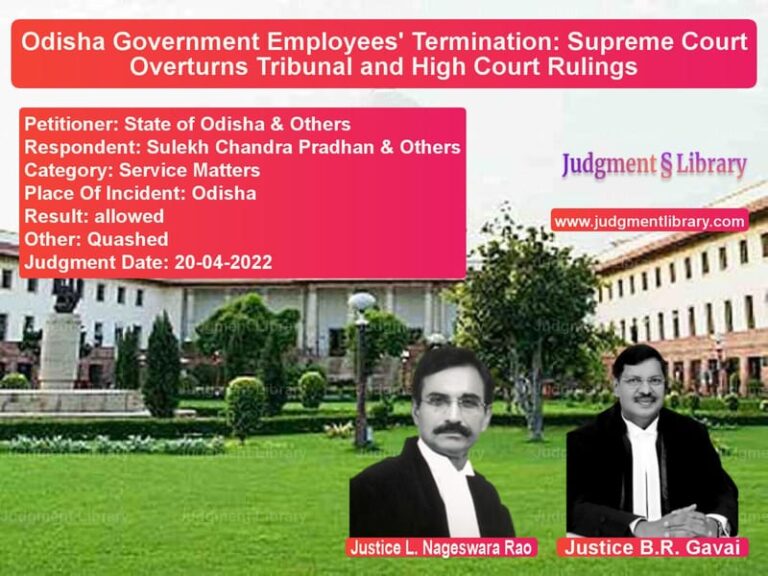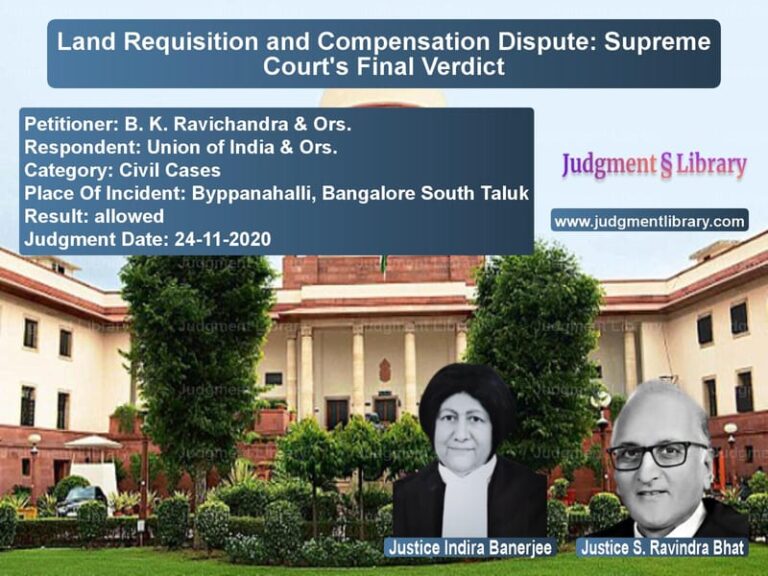Murder Conviction Overturned: Supreme Court Acquits Moorthy in Tamil Nadu Murder Case
The Supreme Court of India recently delivered a significant judgment in Moorthy vs. State of Tamil Nadu, overturning the murder conviction of the accused due to lack of conclusive evidence. The judgment, delivered by Abhay S. Oka and Sanjay Karol, emphasized the importance of proving guilt beyond reasonable doubt in cases based on circumstantial evidence.
This ruling reaffirms the fundamental principles of criminal law, particularly regarding the evidentiary value of extra-judicial confessions and the last-seen theory. The Court reiterated that suspicion, no matter how strong, cannot substitute for legal proof.
Background of the Case
The case revolved around the murder of Shanthi, who was allegedly killed by her husband, Moorthy, on May 29, 2006, near the Ponnai River in Tamil Nadu. The prosecution claimed that Moorthy suspected his wife of infidelity and, in a fit of rage, assaulted her with a stick, leading to her death. He then buried her body near the riverbank and misled her parents about her whereabouts.
Chronology of Events
- May 29, 2006: Shanthi was allegedly taken to the Ponnai River by Moorthy and murdered.
- August 10, 2006: Moorthy allegedly made an extra-judicial confession to a Village Administrative Officer.
- August 11, 2006: Based on the confession, the police recovered the body and arrested Moorthy.
- March 31, 2008: The trial court convicted Moorthy under Sections 302 and 201 of the IPC and sentenced him to life imprisonment.
- January 28, 2009: The Madras High Court upheld the conviction.
- August 18, 2023: The Supreme Court overturned the conviction and acquitted Moorthy.
Petitioner’s Arguments
The appellant, represented by Senior Counsel, contended:
- The case was based entirely on circumstantial evidence, without direct proof linking the accused to the murder.
- The prosecution failed to establish an unbroken chain of evidence necessary for conviction.
- The extra-judicial confession was made to a Village Administrative Officer, who was a complete stranger to the accused, making its authenticity doubtful.
- The alleged confession was made more than two months after the incident, which raised questions about its voluntariness.
- The last-seen theory was weak as the prosecution failed to prove that the accused and the deceased were together immediately before her death.
- The prosecution did not conduct a DNA test to establish the identity of the body.
- Witnesses who were supposed to support the last-seen theory turned hostile.
Respondent’s Arguments
The State of Tamil Nadu, represented by Senior Counsel, countered:
- The extra-judicial confession was voluntary and provided details that led to the recovery of the body.
- The accused led the police to the location where the body was buried, proving his involvement.
- While some witnesses turned hostile, the testimonies of key witnesses supported the prosecution’s case.
- The weapon of offense (a wooden stick) was recovered at the instance of the accused.
Supreme Court’s Analysis
The Supreme Court ruled in favor of the appellant, holding that the prosecution failed to prove the case beyond reasonable doubt.
1. Extra-Judicial Confession is a Weak Piece of Evidence
The Court found the extra-judicial confession unreliable due to the following reasons:
“An extra-judicial confession can be relied upon only if it is proved to be voluntary and truthful. Normally, a person would confide about a crime committed by him only with someone he trusts. The appellant allegedly made a confession to a complete stranger, which is highly improbable.”
2. Failure to Establish the Last-Seen Theory
The prosecution failed to prove that the accused and the deceased were together before her death. The Court observed:
“The prosecution could not establish that the accused and the deceased were last seen together at a proximate time before her death. The theory of last-seen together must be backed by strong corroborative evidence, which is absent in this case.”
3. No DNA Test to Confirm Identity
The body was in a decomposed state when recovered. The prosecution relied on the victim’s parents identifying her by her clothes, but the Court noted:
“A DNA test should have been conducted to confirm the identity of the skeleton. The prosecution’s failure to establish this crucial fact weakens the case significantly.”
4. Discrepancies in the Recovery of the Weapon
The stick allegedly used for the murder was recovered from a different location than initially stated. The Court observed:
“There is a material discrepancy between the testimony of the Investigating Officer and the Village Administrative Officer regarding the recovery of the weapon. Such inconsistencies raise serious doubts about the prosecution’s case.”
Final Verdict
The Supreme Court ruled:
- The appeals were allowed, and the High Court and trial court judgments were quashed.
- The accused, Moorthy, was acquitted of all charges.
- The Court directed that Moorthy be released immediately unless required in other cases.
This ruling reinforces the principle that circumstantial evidence must establish guilt beyond reasonable doubt. It serves as a reminder that mere suspicion is not sufficient for conviction in criminal cases.
Petitioner Name: Moorthy.Respondent Name: State of Tamil Nadu.Judgment By: Justice Abhay S. Oka, Justice Sanjay Karol.Place Of Incident: Ponnai River, Tamil Nadu.Judgment Date: 18-08-2023.
Don’t miss out on the full details! Download the complete judgment in PDF format below and gain valuable insights instantly!
Download Judgment: moorthy-vs-state-of-tamil-nadu-supreme-court-of-india-judgment-dated-18-08-2023.pdf
Directly Download Judgment: Directly download this Judgment
See all petitions in Murder Cases
See all petitions in Judgment by Abhay S. Oka
See all petitions in Judgment by Sanjay Karol
See all petitions in allowed
See all petitions in Quashed
See all petitions in supreme court of India judgments August 2023
See all petitions in 2023 judgments
See all posts in Criminal Cases Category
See all allowed petitions in Criminal Cases Category
See all Dismissed petitions in Criminal Cases Category
See all partially allowed petitions in Criminal Cases Category







